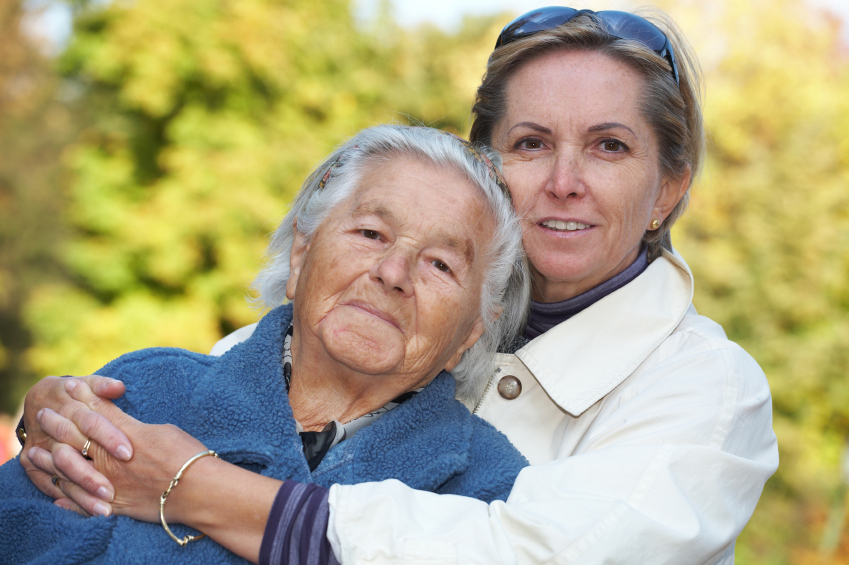AARP Hearing Center

As parents reach their golden years, many need their adult children’s help for daily living or for simple tasks like rides to doctor’s appointments and going to the grocery store or more intense care such as dressing, bathing and administering medication.
According to the Family Caregiver Alliance, 65 percent of older adults rely on family and friends for long-term care needs with 30 percent supplementing family care with paid providers. These informal providers give nearly $500 billion in valued services. A majority of the time — an estimated 66 percent — the caretaking tasks fall to women who give at least 20 hours of unpaid care on average while also balancing their own families and working outside the home.
When folks are giving so much of themselves to others, caregivers often suffer burnout from physical, mental and emotional exhaustion, including anxiety, stress and depression. “You have to make sure that you are not overextending yourself,” said Tammy Bresnahan, AARP’s associate state director for advocacy. “… That is why we recommend that you find breathing exercises and/or yoga or try to carve out a little bit of time for yourself so you are not all consumed.”
She suggests siblings may want to split up duties if possible, such as one takes the parent to doctor’s appointments while the other does home visits.
Elizabeth Weglein, CEO of the Elizabeth Cooney Care Network, believes it is important for caregivers to take time for themselves.
“If you are able to take care of yourself, you can take better care of someone else,” she said. “Most caregivers put themselves at the bottom row and take care of themselves last. Their health deteriorates fairly quickly. So really the mantra should be always take care of yourself.”
The advice is similar to the scenario you hear before an airplane flight from attendants who instruct caregivers, in the case of an emergency, to put on their oxygen masks first before helping their loved ones.
“Caregivers don’t always realize it when they are in the midst of it,” Weglein said. “They need to be taking care of themselves, getting time off. Even just going to the grocery store alone or going to get their hair done or seeing a friend and having lunch. Just having some downtime to talk. The value of that break is so high.”
One of the biggest needs for caregivers is respite care. Some caregivers need to attend out-of-town funerals or important events. Others need to have surgery or be in a medical facility for a short time.
Maryland is one of 16 states that utilizes a federal grant to provide emergency respite care services within 72 hours, allotting families $225 a year for services. Beginning in fall 2017, the Elizabeth Cooney Care Network serves as administrator.
“The individuals who have utilized (the grant) were very thankful,” Weglein said. “They really did not have any resources to turn if it had not been for the grant. …The good part is it doesn’t have a lot of strings. There is no economic requirement. They just have to have a need. It is supporting respite care which means it is helping the primary caregiver.”
Weglein believes the grant is unique because it can be triggered so quickly and families may call themselves.
“In Maryland, there are a lot of gatekeepers where you have to call this entity, get prequalified and then call,” Weglein said. “This particular grant was really designed to be very free and accessible that a family caregiver could just call Elizabeth Cooney 24 hours a day, trigger the grant and then services would be rendered within a 72-hour period for the total of $225. We’ve been very creative with that $225 to create support systems that really maximize the need for that individual.”
The Maryland Healthy Families Working Act, which took effect in February, also helps caregivers. The bill, vetoed by Gov. Larry Hogan but overridden by the Maryland General Assembly, requires employers with 15 or more employees to provide paid sick/safe leave for up to five days. Before the act, some fields, such as retail and food service, had no paid sick/safe leave.
“There is some fear from some businesses that it is going to hurt the business,” Weglein said. “… My perspective on how we treat our employees and also how we treat our clients (is) you support your team. The stronger and happier and healthier your team is, the stronger your company is.”
Weglein notes the better we understand taking care of our own families, especially with the aging population, the better we will be as a society in the state.
“Overall, financially, if we keep and take care of our citizens, it is really a matter of keeping our economic base strong so people don’t move to Delaware,” Weglein said. “They don’t move to Florida or North Carolina. They don’t look and seek other pathways to get care.”
NOTE: For additional information, visit AARP Maryland's Caregiver Resource Page.































































